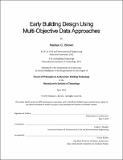Early building design using multi-objective data approaches
Author(s)
Brown, Nathan C.(Nathan Collin)
Download1135799547-MIT.pdf (14.33Mb)
Other Contributors
Massachusetts Institute of Technology. Department of Architecture.
Advisor
Caitlin T. Mueller.
Caitlin T. Mueller.
Terms of use
Metadata
Show full item recordAbstract
During the design process in architecture, building performance and human experience are increasingly understood through computation. Within this context, this dissertation considers how data science and interactive optimization techniques can be combined to make simulation a more effective component of a natural early design process. It focuses on conceptual design, since technical principles should be considered when global decisions are made concerning the massing, structural system, and other design aspects that affect performance. In this early stage, designers might simulate structure, energy, daylighting, thermal comfort, acoustics, cost, and other quantifiable objectives. While parametric simulations offer the possibility of using a design space exploration framework to make decisions, their resulting feedback must be synthesized together, along with non-quantifiable design goals. Previous research has developed optimization strategies to handle such multi-objective scenarios, but opportunities remain to further adapt optimization for the creative task of early building design, including increasing its interactivity, flexibility, accessibility, and ability to both support divergent brainstorming and enable focused performance improvement. In response, this dissertation proposes new approaches to parametric design space formulation, interactive optimization, and diversity-based design. These methods span in utility from early ideation, through global design exploration, to local exploration and optimization. The first presented technique uses data science methods to interrogate, transform, and, for specific cases, generate design variables for exploration. The second strategy involves interactive stepping through a design space using estimated gradient information, which offers designers more freedom compared to automated solvers during local exploration. The third method addresses computational measurement of diversity within parametric design and demonstrates how such measurements can be integrated into creative design processes. These contributions are demonstrated on an integrated early design example and preliminarily validated using a design study that provides feedback on the habits and preferences of architects and engineers while engaging with data-driven tools. This study reveals that performance-enabled environments tend to improve simulated design objectives, while designers prefer more flexibility than traditional automated optimization approaches when given the choice. Together, these findings can stimulate further development in the integration of interactive approaches to multi-objective early building design. Key words: design space exploration, conceptual design, design tradeoffs, interactive design tools, structural design, sustainable design, multi-objective optimization, data science, surrogate modeling
Description
This electronic version was submitted by the student author. The certified thesis is available in the Institute Archives and Special Collections. Thesis: Ph. D. in Architecture: Building Technology, Massachusetts Institute of Technology, Department of Architecture, 2019 Cataloged from PDF version of thesis. Includes bibliographical references (pages 201-219).
Date issued
2019Department
Massachusetts Institute of Technology. Department of ArchitecturePublisher
Massachusetts Institute of Technology
Keywords
Architecture.